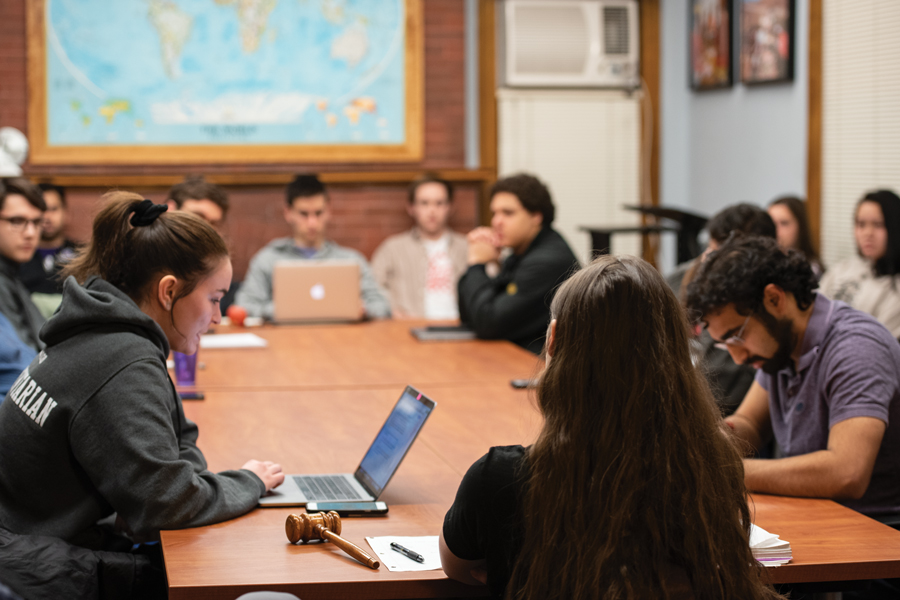Does ASG really matter for students? Political Union majority votes yes
Daily file photo by Caroline Megerian
Elizabeth Sperti delivers a statement during a previous Political Union meeting. The Weinberg sophomore argued in favor of ASG’s importance to students.
May 11, 2020
In the wake of the 2020 Associated Student Government presidential election, Northwestern University Political Union debated Monday whether ASG matters for the student body.
In a 10 to 7 vote, with one abstention, a majority voted that ASG does matter for the student body. Weinberg sophomore Elizabeth Sperti and Weinberg freshman Zack Lori debated for and against the resolution, respectively. Notably, both Sperti and Lori are members of ASG 一 Sperti is the senator for Political Union, while Lori was recently elected parliamentarian.
“Somebody within ASG could 一 because they know a lot more about the organization 一 say more about some of the things ASG could be improving, even though I do think ASG is important,” Lori said.
PU co-president and Weinberg junior Eliana Buckner said the idea for the resolution started partially as a “joke,” but became a reality once the group’s executive board members realized that it was a conversation students were really having. Sperti said the level of conversations surrounding the contested presidential election on social media brought ASG to the attention of students who might not usually pay the organization any mind.
The debate focused on ASG’s representation of the student body and legislative effectiveness.
In his opening statement, Lori argued against the representation setup of the Senate and identified low turnout rates during presidential elections as a sign that ASG does not represent Northwestern’s student population.
According to the current setup, any student group can apply for one of eighteen student group seats, with priority given to organizations that serve marginalized students. Lori said this gives disproportionate voice to some smaller organizations — such as Political Union — over larger ones — such as the four votes representing all students in the four Greek Councils.
However, several debaters pointed out that the current apportionment rules amplify the voices of groups representing marginalized communities.
“I feel like it’s an equalizer,” Weinberg sophomore and ASG rules committee member Pamela Chen said.
Meanwhile, Sperti cited ASG initiatives that have benefited students, such as getting WiFi on the Lakefill, creating open gender housing and expanding the Books for Cats program.
Other members argued that ASG can only accomplish what the University is willing to sanction, citing the Board of Trustees’ rejection of a fossil fuel divestment proposal, despite ASG’s support. Political Union Co-President and Bienen junior Sachin Shukla likened the setup to a dictatorship.
ASG Chief of Staff and Weinberg senior Henry Molnar argued that even if ASG is under the thumb of the University, it still injects student voices into rooms that would otherwise not have them.
The Overton window, or range of politically feasible ideas, that ASG sets will put issues on the map of Northwestern administrators that they wouldn’t otherwise consider, Molnar said.
“For example, it was ASG that got nonbinary students lumped into the 150 Years of Womxn celebration just because of conversations that (former ASG vice president) Adam Davies had had with (assistant vice president for student engagement) Kelly Schaefer and with other administrators,” Molnar said.
Certain policies are incredibly hard to change, Sperti said, but other important policies probably wouldn’t have happened without ASG’s advocacy.
“If ASG is helping even one subset of students that otherwise would’ve been completely ignored, then I think that ASG matters,” Sperti said.
The next meeting will debate whether China will become more powerful than the United States.
Email: [email protected]
Twitter: @meganmuncie
Related Stories:
— Should the government bail out big businesses? Political Union discusses
— What does COVID-19 mean for the 2020 election? Political Union discusses
— Northwestern Political Union holds virtual debate over pass/fail grading


